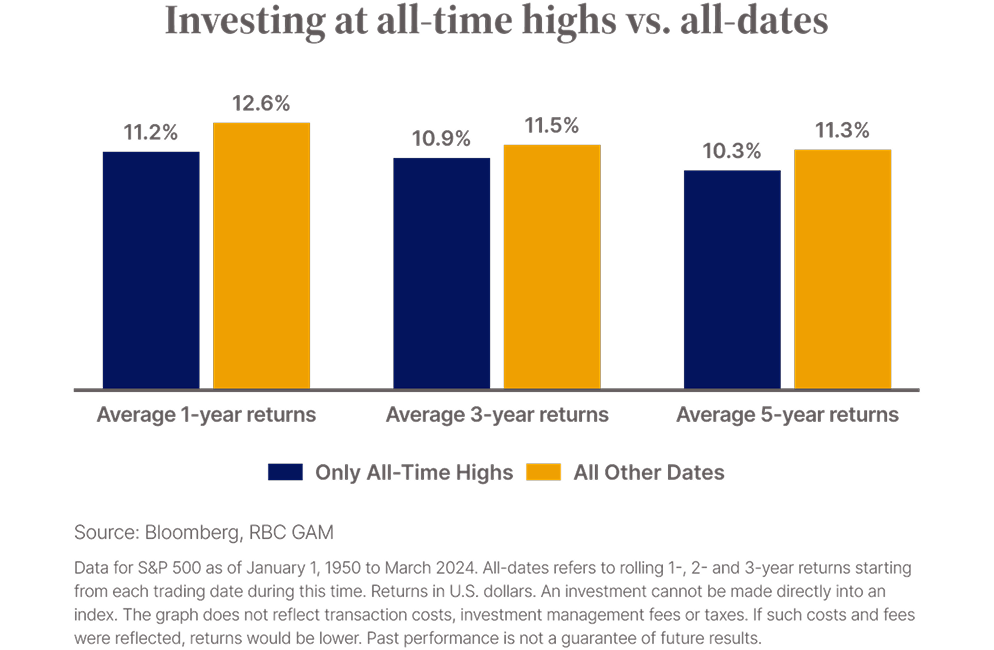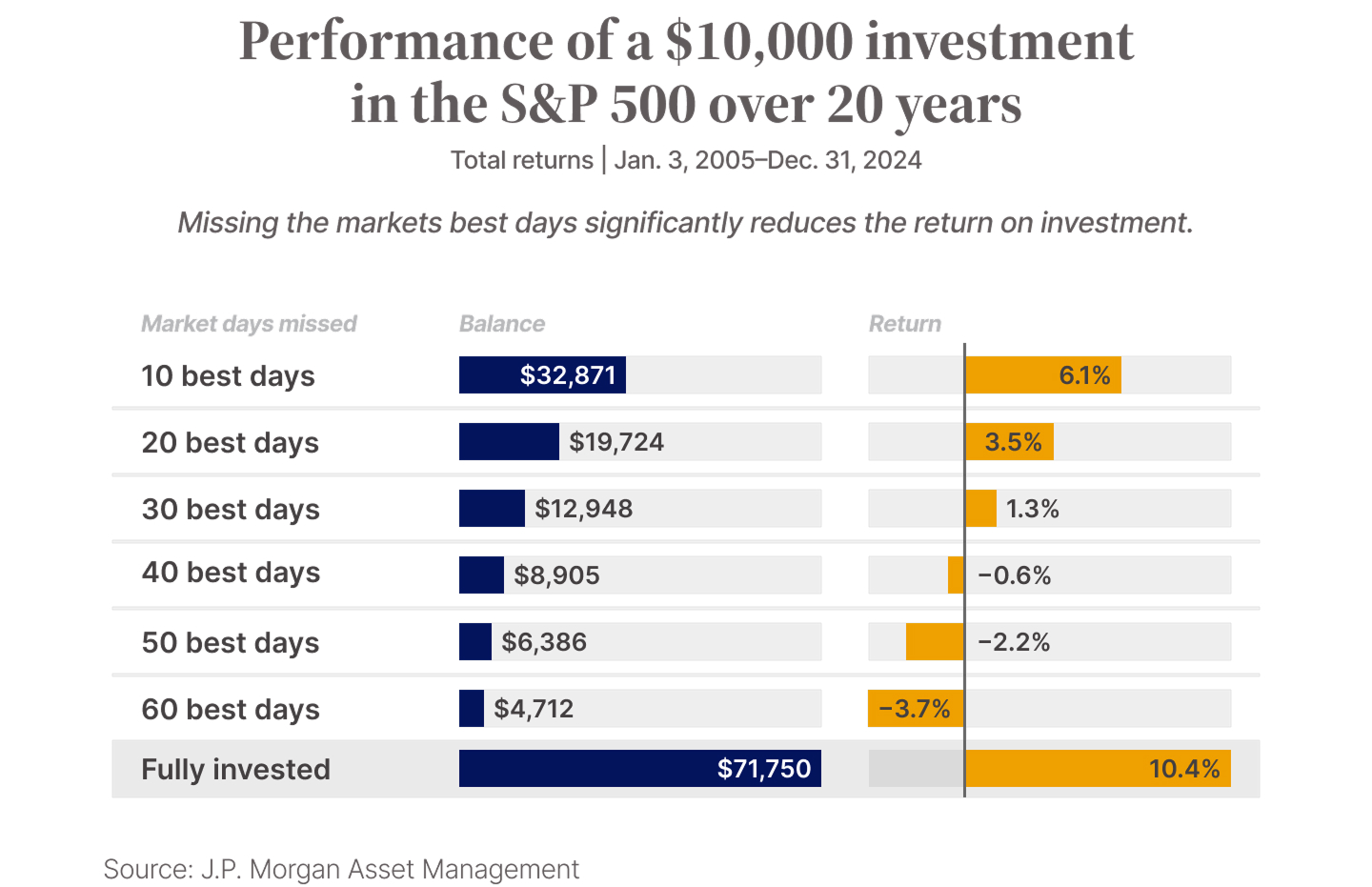Jeff, Matt & Gary · Summit Financial Advisors
Why Market Highs Feel So Scary
(Even When History Says "Relax")
Markets are up. Your portfolio looks strong.
So why does it feel like a drop is coming?
If you've ever thought, "This must be the top," you're in good company. That fear is hardwired into our brains.
But here's the truth: Historically, investing at new highs delivers returns similar to buying at any other time.
This short read breaks down the psychology behind "that fear" and why the data tells a different story.
"It's not about ignoring fear. It's about understanding where it comes from and what the data actually says."
Not receiving our newsletter?
Get insightful info on finances and more in your inbox every month with the
VISUAL INSIGHTS NEWSLETTER
The Mental Math That Misleads Us
Buying at Highs ≠ Buying at the Wrong Time
It feels risky to invest when markets are riding high. But history tells a different story.
Over the past 70+ years, buying at all-time highs has delivered returns nearly identical to investing on any random day.
The average 1-year return after a market high? 11.2%. On other dates? 12.6%. At 3- and 5-year marks, the difference stays small.1
Of course, past performance doesn't predict future results.
But the numbers are clear: market highs aren't a red flag. They're part of the ride.

Anchoring Bias: Yesterday's Price Still Lives in Your Head
So if investing at highs isn't actually riskier…why does it feel that way?
Blame anchoring bias: our tendency to fixate on the first number we see.^2
Maybe you saw a stock at $455 a few months ago and waited. Now it's $490.
It feels expensive, even if nothing's changed.
This type of mental math leads to regret and inaction.
But markets aren't priced for where they've been. They're priced for where they might go.
We Remember the Crashes, Not the Climbs
Anchoring bias isn't the only thing at play.
Our brains also exaggerate whatever happened most recently, especially if it ended badly.
That's why highs feel scary.
If the last one you remember preceded a drop, that's what sticks.
Not the years of growth. Just the drop.
It's like a great vacation spoiled by an awful airport delay. One bad moment overshadows the rest.
Investing can feel the same.
One crash after a peak doesn't make every high a warning. But your brain treats it like one.
Control Feels Safer Than Action
Moreover, buying at new highs feels risky because it means surrendering control.
If the market dips, regret hits harder: "Why didn't I wait?"
That's regret aversion at work. We'd rather do nothing than risk feeling foolish.3
And sitting in cash creates a false sense of control, even though markets rarely follow our script.
This illusion of control can be comforting. But long-term success usually comes from staying consistent, not trying to outsmart uncertainty.
The High Price of Sitting Out
When markets are volatile, it can feel reasonable to take a cautious approach. But stepping out--even briefly--has historically come with tradeoffs.
From 2005 to 2024, a hypothetical $10,000 investment in the S&P 500 grew to $71,750 if left untouched the entire time.4
Missing just the 10 best days during that same period would have reduced that value to $32,871--a much lower outcome over two decades.4
It's also worth noting that 7 of those 10 best days occurred within two weeks of the worst days. That suggests some of the strongest gains tend to cluster around periods of heightened uncertainty.4
While past performance doesn't guarantee future results, this underscores how difficult it can be to predict the right moments to be in or out of the market.

While the illusion of control can be comforting, long-term success usually comes from staying consistent—not trying to outsmart uncertainty.
It's Not About Timing. It's About Trusting the Process.
The bottom line…
Feeling anxious at a market high is normal. You're not doing it wrong. You're just human.
The key is knowing how your brain might be playing tricks on you and building a plan that keeps those instincts in check.
If you're not sure what to do next, that's okay. Let's figure it out together.
Sincerely,
Jeff, Matt & Gary
Summit Financial Advisors
https://www.summitadvisorsmn.com/
P.S. Sign up for my emails. My subscribers get my best insights.

Jeff, Matt & Gary
Summit Financial Advisors
Not receiving our newsletter?
Get insightful info on finances and more in your inbox every month with the
VISUAL INSIGHTS NEWSLETTER

Jeff, Matt & Gary
Summit Financial Advisors
.png)
.png)

-
Bloomberg, RBC GAM, 2024 [URL: https://www.rbcgam.com/en/ca/learn-plan/investment-basics/investing-at-all-time-highs/detail]
-
The Decision Lab, 2025 [URL: https://thedecisionlab.com/biases/anchoring-bias]
-
The Decision Lab, 2025 [URL: https://thedecisionlab.com/biases/regret-aversion]
-
CNBC, 2025 [URL: https://www.cnbc.com/2025/04/07/selling-out-during-the-markets-worst-days-can-hurt-you-research.html]
Risk Disclosure: Investing involves risk including the potential loss of principal. No investment strategy can guarantee a profit or protect against loss in periods of declining values. Past performance does not guarantee future results.
This material is for information purposes only and is not intended as an offer or solicitation with respect to the purchase or sale of any security. The content is developed from sources believed to be providing accurate information; no warranty, expressed or implied, is made regarding accuracy, adequacy, completeness, legality, reliability, or usefulness of any information. Consult your financial professional before making any investment decision. For illustrative use only.
Level Four Financial professionals (“We”) are committed to acting in our retail client’s best interest. For important Regulation Best Interest information, including Form CRS and other disclosures please click here.
We cannot accept any orders and/or instructions regarding your account by email, voice mail, fax or any alternate method. Securities offered through Level Four Financial, LLC Member FINRA/SIPC. Advisory services offered through Level Four Advisory Services, LLC, an SEC-registered investment adviser. Insurance services offered through Level Four Insurance Agency, LLC. Summit Financial Advisors, Level Four Financial, LLC, Level Four Advisory Services, LLC, and Level Four Insurance Agency, LLC are independent entities. Accounts carried by Raymond James & Associates, Inc. Member New York Stock Exchange/SIPC. E-mail sent through the internet is not secure or confidential. This e-mail is intended only for the person or entity to which it is addressed and may contain confidential and/or privileged material. Any review, retransmission, dissemination or other use of, or taking any action in reliance upon, this information by persons or entities other than the intended recipient is prohibited. If you received this message in error, please contact the sender immediately and delete the material from your computer.
Become an Insider
Get insightful updates on markets and the world delivered straight to your inbox every month.
No thanks
You're Signed Up!

Jeff, Matt & Gary
Summit Financial Advisors
Stay tuned — an email from me is on its way to your inbox right now.
.png)
.png)
.png)